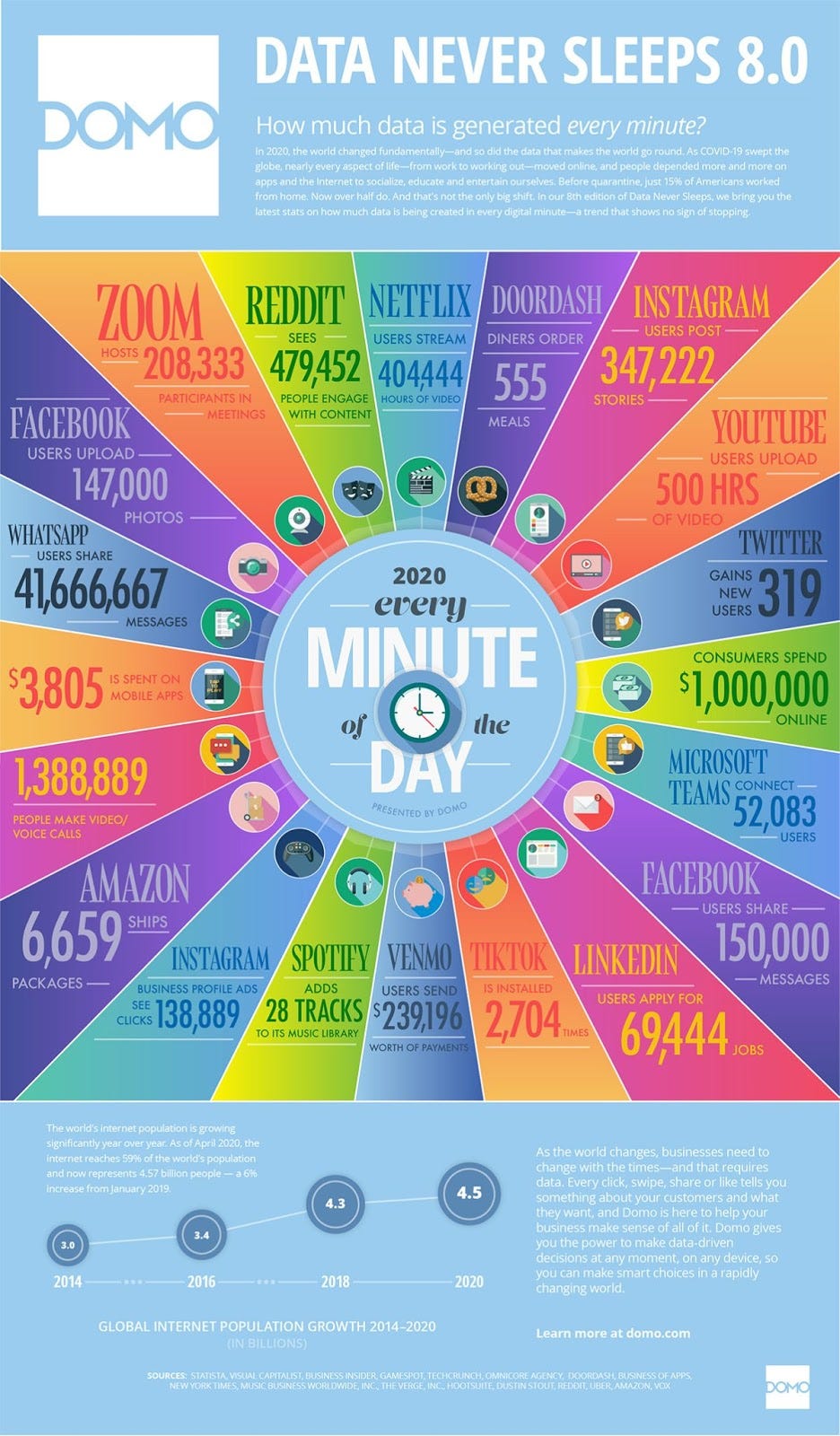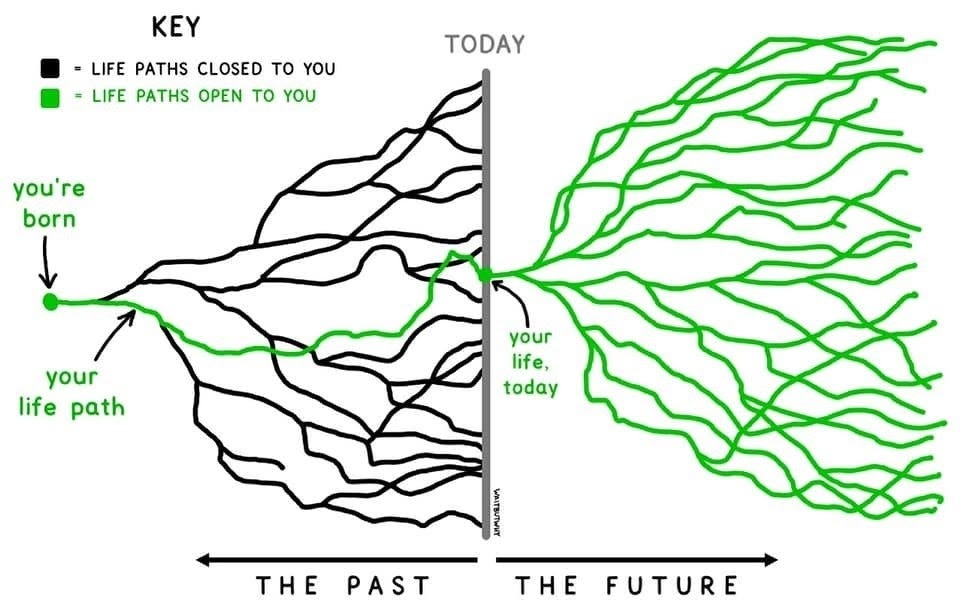The Portfolio Career Revolution
Why there's a 50% chance you'll be an independent worker by 2030
Anoushka Khandwala, a 24-year-old freelancer, has never experienced the notorious ‘Sunday scaries’ (envy can be healthy sometimes, don’t worry). Since graduating from university in 2018, she’s worked as a lecturer, a freelance graphic designer, a magazine editor, a writer, a photographer, and an illustrator. In short–she is a portfolio professional. She also happens to be my sister, so I’ve been able to inspect her journey up close (and pick it apart for the purposes of this blog post 😇).
Portfolio professional: “A portfolio professional is someone who has multiple sources of income at the same time. For some, that can mean several part-time jobs or a range of freelance gigs. For others, it’s running a consulting business or offering short-term services like training to a range of clients. It’s about making your career into what you want it to be and having a tangible portfolio that showcases the work you’ve done. Even more than that, it’s about being in control of how, when and why you work.”
Much to my parents’ shock horror, my sister is no longer an outlier. People are increasingly shunning the default 9-5 in favour of working flexibly for various employers, monetising different skills, and building multiple streams of income. The OECD predicts that by 2030, 50% of professionals will be building a portfolio career. In fact, 61% of Gen Z would rather be an entrepreneur than an employee after graduating from university.
In this piece, I’ll explore why I believe that individuals are the businesses of the future. I’ll break this down into two parts. First, we’ll explore 3 key factors that are fuelling the disaggregation of work. Secondly, we’ll discuss 3 ways the world has changed to make building a portfolio career more feasible than ever before.
Part 1: The Disaggregation Of Work
1️⃣ The Digital Native
Gen Z is the first digitally native generation. Between 2010 and 2021, the percentage of the global population that is online has grown from 30% to 60%. And the scale of the internet is truly mind-boggling. Every day, we create roughly 2.5 quintillion bytes of data. Ever heard of a quintillion? Me neither…but it’s a lot. The digital age has not only reshaped our media creation and consumption habits, but it is also reshaping an entire generation’s definition of work and success.
Source: Visual Capitalist
76% of Gen Z describe themselves as responsible for driving their own career, whilst more than one-third of young people in the UK had a side hustle even before the pandemic. Rather than pursuing the traditional corporate route, more young people are hoping to follow in the footsteps of celebrity entrepreneurs and media stars by leveraging the power of the internet to scale their work through coding, writing, podcasting, Youtubing, and side hustling. The digital native generation is building their career on the foundation of ‘leverage’.
Leverage: “The most interesting and the most important form of leverage is the idea of products that have no marginal cost of replication. This was only invented in the last few hundred years. It started with the printing press. It accelerated with broadcast media, and now it’s really blown up with the internet and with coding. Now, you can multiply your efforts without involving other humans and without needing money from other humans.”
The mainstream creation of digital leverage has created thousands of routes to financial independence that simply didn’t exist in the pre-internet age. It is the major catalyst behind a shift to a more distributed, digital, and individualised workforce.
Source: Wait but Why?
2️⃣ The Backlash to Centralised Power
Gen Z has been burned by two of the most globally traumatic events in recent history–the Great Recession and COVID-19. As a result, this generation is rejecting traditional routes and the pressures of institutional authority. For one, they have seen their parents struggle within the confines of a poorly designed system, fuelling their desire to carve their own path, rather than ‘renting out’ their most precious resource–time.
Secondly, the gaping failures of governments around the world have been thrown into sharp focus by their response to COVID-19, with young people accounting for two-thirds of the job losses since the onset of the pandemic. As Erik Torenberg argues in Why Are Institutions Failing Us, the collapse of trust in centralised power is creating a shift towards a more decentralised way of consuming and producing information. This cultural move towards decentralisation is mirrored by the individualisation of work, with more people believing they must rely on themselves–rather than institutions–to be financially secure and successful.
3️⃣ The Great Refocusing
This year, the disintegration of the work-life boundary has spotlighted the person behind the professional. People are reexamining aspects of both their personal and professional lives and realising what truly matters to them. Do you want to go back to the 9-5 grind, or do you want to be able to take your child to nursery every morning? Do you want to go back to the office, or do you want to embrace the digital nomad lifestyle? Do you want to sign your life away to a corporate whose mission doesn’t resonate with you, or do you want to take a risk and start an impactful business?
A renewed appreciation for one’s time, focus, and family makes it likely that an increasing number of people will start to make values-based choices for their careers, rather than following the status quo. Sure, WFH has been a nightmare in many respects, but the hardships that the past year have brought have also shown us the importance of working to live, rather than living to work.
PART 2: The Ease Of Building A Business Around Yourself
Now we’ve explored the broader macro trends that have made portfolio careers more mainstream, I want to show you why they’re more feasible than ever. Let’s break it down into the three basic building blocks of business: build, market, and sell.
1️⃣ Build: The Rise of No-Code
The rise of the no-code movement has made it easier than ever for anyone to build. Gone are the days when you had to rely on outsourcing or agencies to get the job done. Need to make a landing page? Webflow. Beautify a graphic? Canva. Create a marketplace? Shopify. And if you really can’t do it yourself, you can recruit someone on Fiverr for...well, a fiver. The no-code movement has democratised access to skills that were previously an expensive rarity.
2️⃣ Market: The Creator Economy Boom
In the pre-internet era, reaching 1000s of people required corporate-sized budgets. Today, the boom of the creator economy has brought content creation, audience building and influencer marketing into the mainstream. It has never been easier to create global awareness of yourself and your brand. In a TikTok-first world, an online following is practically synonymous with a ready-made customer base. To gain traction around their individual business, portfolio careerists will start to develop personal brands and communities around their work in much the same way as creators. In a remote workforce where people shun centralised power but seek belonging, communities of portfolio professionals will become instrumental to people’s success and mental health.
3️⃣ Sell: The Death of the Middleman
Today, not only is it easier to build and market, but it’s simpler to sell. We used to live in a world where middlemen controlled supply. Take publishing a novel: in the past, authors would require the services of a printing press and a distributor to get their magnum opus into the hands of their readers. Without them, people simply wouldn’t have been able to access literature. Today, we are seeing a sharp rise in platforms like Patreon that give individuals–creators, artists and freelancers–direct access to their fans and customers. Whether it’s products, news or songs - global distribution has been democratised and middlemen are largely obsolete.
What’s Next For The Portfolio Career Revolution?
Collectively, Gen Z’s digital-first lifestyle, their backlash to centralised power, and the lightbulb moments induced by COVID-19 are leading to a more disaggregated world of work. Between the rise of no-code, the ease of audience-building, and the simplification of distribution, there has never been a better time to build a business around yourself.
In next week’s blog post, we’ll explore why an economy that empowers portfolio professionals will be a great equaliser, the benefits of building a portfolio career, and the gaps we need to fill to help these professionals thrive.





This is such an impactful summary of the current climate of work that so clearly breaks down the cause and effect relationships we are experiencing today - I can't wait until next week's post!
I love the way you write Nikita. Great work.